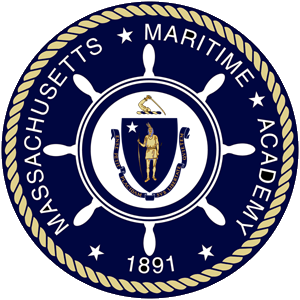Energy System Engineering
Marine Engineering & Energy Systems Engineering Dual Major
Each year a few Energy Systems Engineering students wish to duel-major with Marine Engineering. To complete both programs, these students must meet the curriculum requirements of both degrees, and in addition, order to receive STCW certification these students must complete all the STCW requirements of the Marine Engineering Program as approved by the USCG.
The following courses in the Energy Systems Engineering program will be accepted as substitutes for the corresponding courses in the Marine Engineering Program, and will address the associated STCW Knowledge components. These courses are generally similar to their ME equivalents, however they are taught with a higher level of mathematical rigor. As with the Marine Engineering program, any courses containing STCW Knowledge elements must be passed with a grade of "C-" or better.
EN-2101 Engineering Statics
Course covers static analysis of two- and three-dimensional bodies in equilibrium; determination of forces, moments, couples, and equivalent force systems; forces in members due to concentrated and distributed loads; analysis of trusses, frames, and machines; shear and bending moment diagrams; frictional forces; determination of centers of gravity and moment of inertia. The course is a more thorough treatment of the material in EN-2211, emphasizing vector algebra and application of integral calculus.
This course is an acceptable substitute for EN-2211 Mechanics
EN-4803 Thermodynamics of Power Systems
More in depth than EN-3211, this course will cover the 2nd Law of Thermodynamics and its effect on the thermal efficiency of heat engines and power plants. It will also introduce the property of entropy and its use in analyzing power cycles and subsidiary components, such as turbines, compressors, pumps and pistons. These concepts will be applied to analyze engineering power cycles, including the Otto, Diesel and Brayton gas cycles, the Rankine vapor power cycle used in steam power plants, binary and combined cycles, and cogeneration. Fuel combustion and compressible flows in nozzles will also be covered.
This course is an acceptable substitute for EN-3211 Thermodynamics.
**EN-3201 Fluid Dynamics **
In this course, more in depth than in EN-4111, students study the fundamentals of fluid dynamics. Topics include hydrostatics (pressure distribution, forces on submerged surfaces, Archimedes’ principle), Newton’s law of viscosity, use of differential and finite control volume analysis with the basic laws (conservation of mass, momentum, and energy), differential formulation of basic laws (Navier-Stokes), piping systems, vorticity, boundary layers, drag coefficient, and turbulence.
This course addresses the following three STCW Knowledge elements:
- OICEW-A4.1 Principles of fluid flow
- OICEW-A5.1 Operational characteristics of pumps
- OICEW-A5.1 Operational characteristics of piping systems
This course is an acceptable substitute for EN-4111 Fluid Mechanics, and the STCW requirements of EN-4112 will be met if it is passed with a "C-" or better.
EN-4803L Power Systems Laboratory
This course provides students with hands-on experience in thermo-fluid aspects of industrial power systems. The laboratory will demonstrate selected topics covered in EN- 4803 and EN-3201. Topics include applications of the 1st and 2nd Laws of Thermodynamics, compressible ideal gases, fluid pumps, internal combustion engines, and steam cycles and properties. Students will learn experimental methods and the concepts of measurement accuracy, precision, bias, and aliasing. They will become familiar with the use of computer-linked data acquisition systems, digital thermocouples and pressure transducers, as well as analog pressure gages, manometers, flow meters, and dynamometers and stroboscopes for torque and shaft rotational speed measurement. Students will maintain a detailed laboratory notebook and will communicate the results of these experiments in written engineering technical reports and memoranda. A summary group design project will be assigned to foster teamwork and professional engineering communications, both written and verbal.
This course is an acceptable substitute for EN-4112 Thermo/Fluids Lab. The STCW knowledge elements of EN-4112 are addressed in EN-3201 Fluid Dynamics.
EN-3603 Instrumentation and Control
Covers instrumentation and control fundamentals and applications to facility systems including documentation. Both analog and digital control systems are covered. It is also an introduction to programmable logic controllers.
This course addresses the following STCW Knowledge elements
- OICEW-A4.1 Basic construction and operation principles of automatic control systems
- OICEW-A5.1 Operational characteristics of control systems
- OICEW-B1.1 Basic configuration and operation principles of sequential control circuits and associated devices
- OICEW-B1.2 Flowchart for automatic and control systems
- OICEW-B1.2 Functions, characteristics and features of control systems for machinery items
- OICEW-B1.3 Various automatic control methodologies and characteristics
- OICEW-B1.3 Proportional–Integral–Derivative (PID) control characteristics
- OICEW-B1.3 Associated system devices for process control
- OICEW-B1.3 Configuration and operation principles of control systems
- OICEW-B2.5 Function and performance tests of electrical and electronic monitoring systems
- OICEW-B2.5 Function and performance tests of electrical and electronic automatic control devices
- OICEW-B2.5 Function and performance tests of electrical and electronic protective devices
This course is an acceptable substitute for EN-3216 Operational Controls, and the STCW requirements of EN-3216 will be met if it is passed with a "C-" or better.
